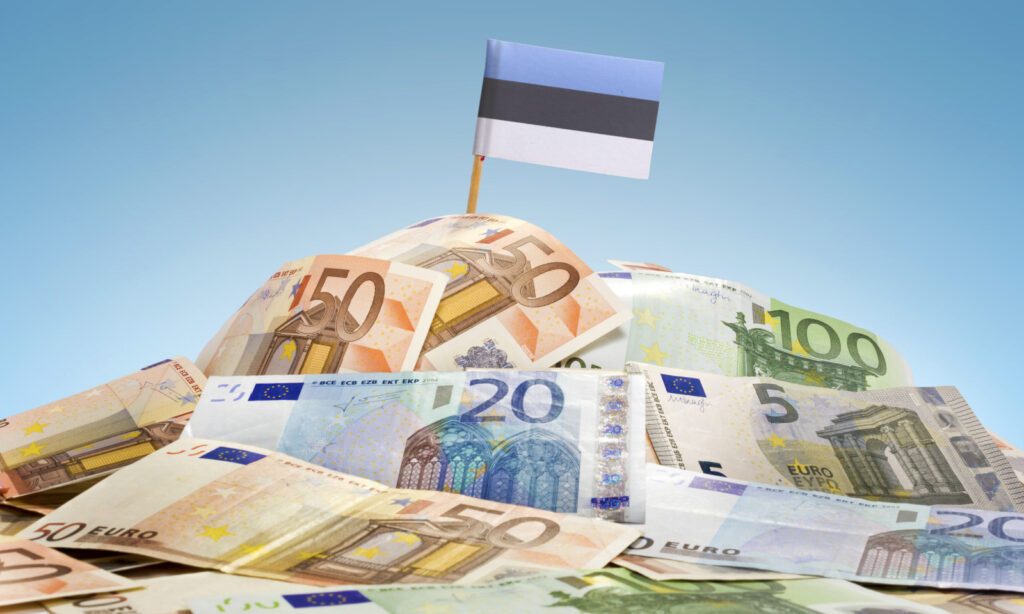Access to customer bank transaction data provides a basis for more intelligent business decisions

In 2021, Creditinfo Estonia received permission from the Financial Supervision Authority to start offering account information services in Estonia, which later expanded to the markets of Latvia and Lithuania. Today, they have been offering the account information service on the market for almost two years. The PSD2 directive regulates the account information service, that grants account information service provider (Creditinfo) access to the transaction data of end-customers of banks and financial institutions, using a secure data transmission channel and customer consent.
Intelligent business decisions can only be made when decision-makers have enough information when making the decision. Decisions made without comprehensive information may remain superficial or rely too much on intuition. A joint decision becomes smart by including relevant, up-to-date, appropriate and verified data for decision-making, analyzing it and drawing conclusions from it.
Companies that want to be competitive in the market and, at the same time, grow faster than the market must act consciously and operatively to take advantage of the exponentially increasing amount of data and to navigate the diverse data landscape. The word “action” means the application of well-thought-out multiple technologies, the careful selection of primary data and adaptation to large, innovative data sets that provide the company with necessary data inquiries and detail-specific analyses. The actions mentioned in the previous sentence are based on the data value chain – a framework for managing data from collection to decision-making.
Access to bank transaction data gives the financial sector and several other sectors an unlimited opportunity to use innovative data sets to improve their business processes. Data (including account data) collection, analysis, targeted use and data-driven decision-making directly relate to Creditinfo’s core business. Creditinfo has invested a lot of time and knowledge to ensure and support its customers in successfully using the account information data. Remember that the customer does not have to invest resources in implementing the necessary specific technologies and data analysis in addition to their core business to filter and acquire value from bank transaction data.
Creditinfo adds value to account data with information from other sources
Bank transaction data helps to make more intelligent and more informed decisions regarding the products, services and conditions offered to the end customer. Figuratively speaking, credit bureau data enlighten one corner of the room of a person’s financial behavior, and the information obtained from account transactions enlightens the other corner of the room of a person’s financial behaviour.
Account information, besides evaluating financial behavior, provides information about a person’s daily habits, experiences, preferences, hobbies and much more.
In summary, access to the data of the end customer’s bank transactions provides a foundation for making business decisions based on an even more extensive and significantly more diverse data set, in other words, making decisions even smarter. As a universal, comprehensive solution provider throughout the Baltics, Creditinfo is the only partner for its customers with access to credit bureau data, global KYC data, and bank account data.
Visit creditinfo.ee/en for more information.
Ivo Vallau
Open Banking Product Manager, Ceditinfo Estonia.
Creditinfo appoints Satrajit Saha as new Global CEO

Former CEO of TransUnion Europe – Satrajit Saha – brings his expertise to Creditinfo, planning to drive growth across its credit bureaus globally.
London – 29th November 2023: Creditinfo, a global service provider for credit information and risk management solutions, has today announced the appointment of Satrajit Saha as its Global Chief Executive Officer (CEO). With over 20 years of experience in banking and credit bureau, Satrajit will drive the growth of Creditinfo and the maturity of its credit bureaus globally. He joins the company from TransUnion Europe, where he held the position of CEO for the last five years.
In his role, Satrajit will lead Creditinfo in advancing its strategic initiatives, with a particular focus on promoting financial inclusion worldwide. Drawing on his rich background in the credit information industry, spread across Asia, Africa, and Europe, he will lead the next phase of Creditinfo’s growth on a global level as it strives to become a truly global bureau and the leader for facilitating access to finance in both developed and emerging markets.
As an experienced strategic leader, Satrajit has an impressive reputation in the financial services space. At TransUnion Europe, he led the board of all TransUnion’s European owned entities. Before joining TransUnion Europe, he was Chief Business Officer at TransUnion India, where he was responsible for crafting and executing TransUnion’s CIBIL’s market strategy. He was also Cards Head, Africa Region, at Barclays Bank.
Satrajit Saha, newly appointed Global CEO at Creditinfo said: “I am honored to take on the role of Global CEO at Creditinfo, a company that is at the forefront of promoting financial inclusion. Together with the talented team at Creditinfo, we will continue to leverage innovative data sets and solutions to bridge information gaps and create opportunities to facilitate access to finance for individuals and businesses globally.”
Monty Ismail, Director at Levine Leichtman Capital Partners and Creditinfo Group Board member said: “We are delighted to welcome Satrajit “Satty” Saha as our new Global Chief Executive Officer. He is an accomplished executive with successful leadership experience relevant to our business, including his time as CEO of TransUnion UK. Today marks the beginning of a new chapter for Creditinfo, and we are excited to see Satty, with extensive knowledge of our key markets, take over as CEO. We are looking forward to working with Satty in continuing to expand our global footprint and unlock access to finance for millions of consumers and businesses worldwide. On behalf of the Board of Directors, I would like to thank Paul Randall for his important contribution as CEO. He has been key to our success, and we are all grateful for his leadership and dedication.”
He will begin his new role as Creditinfo CEO on 1st January 2024 and will report directly to the Creditinfo Group Board.
-END-
About Creditinfo
Established in 1997 and headquartered in London, UK, Creditinfo is a provider of credit information and risk management solutions worldwide. As one of the fastest-growing companies in its field, Creditinfo facilitates access to finance, through intelligent information, software and decision analytics solutions.
With more than 30 credit bureaus running today, Creditinfo has the most considerable global presence in this field of credit risk management, with a significantly greater footprint than competitors. For decades it has provided business information, risk management and credit bureau solutions to some of the largest, lenders, governments and central banks globally to increase financial inclusion and generate economic growth by allowing credit access for SMEs and individuals.
For more information, please visit www.creditinfo.com
A Master’s Thesis that highlighted the importance of timely submission of the Annual Report

In May 2023, Creditinfo Eesti announced a prize fund to recognize students who have addressed research questions in the fields of money laundering and sanctions in their research. In cooperation with the COBALT law firm and the representatives of the State Money Laundering Bureau, the evaluation committee chose Victoria Helenurme, a master’s student from the University of Tartu, as the winner for her master’s thesis on the topic “Prediction of deletion from the business register due to non-submission of the annual financial report using the example of Estonian companies”.
Victoria Helenurm is from Tallinn and graduated cum laude from the University of Tartu, majoring in Marketing & Financial Management. Today, she works as a financial controller in a company offering energy-saving indoor climate and renewable energy solutions and sees her future in business.

We had an interview with her on the journey of her thesis topic:
The topic of your thesis was “Prediction of deletion from the business register due to non-submission of the annual financial report using the example of Estonian companies” – how did you arrive at this topic?
At the beginning of the summer of 2022, discussions began with people who eventually became my thesis supervisors. My main desire was to write a paper on a current topic in society. This year, the Estonian state penalties for not submitting the annual report became harsher, and in cooperation with my supervisors, we saw that there is a public interest in this area of research and also sufficient data for research.
Why was this topic worth researching?
If, as a person, we take a loan, for example, we are understanding the obligations that come with taking a loan. For me, founding a company or being on its board is a somewhat similar responsibility – as a manager, we have assumed the responsibility, among other things, to report on the progress of our company’s business to the public.
Unfortunately, while we are mostly exemplary in servicing loans, tens of thousands of Estonian companies fail to submit their annual reports on time.
I cannot say whether this difference is due to, among other things, the fact that the penalties for not submitting the annual report have been relatively lenient. But it is certainly worthwhile for us to become more aware that such behavior is problematic.
After all the state of our countries businesses is based largely according to the data of the Business Register. If we have thousands of active companies that do not fulfill their reporting obligations, the financial forecasts, risk analyses, business decisions, etc. of the state, lenders and other parties will suffer in its quality.
The submission deadline (6 months after the end of the financial year) is a very lenient deadline. The business landscape is more and more unpredictable, so the knowledge of the previous year’s business results that arrives half a year later is already outdated. As is typical of our e-government, we would expect that at least certain types of companies could be assigned a much earlier submission obligation to help update our economic data.
What facts became clearer as part of the research?
In my research, I tried to find an answer to the question of whether the deregistration of a company can be predicted purely by looking at how the company’s management has cared about the obligation to submit an annual report in its previous business life.
The Estonian financial world is very much a believer in financial ratios when assessing the business health of a company. I tried to see if it is possible to convincingly assess the business risk of deleting the company by completely setting aside the financial statement.
The studied dataset also proved this – a significantly more accurate forecasting method than financial ratios (prediction accuracy approx. 63%) was the observation of the past behavior of board members (prediction accuracy almost 82%). It can be said that if there is a member of the board of the company who has either delayed or failed to submit the financial year report in previous companies, it is a very clear business risk, which indicates the risk of deletion of the company in question.
How could this research topic be continued?
Although I myself rather do not plan to continue my studies in a doctoral program, I definitely see possibilities for expanding this research topic. The obtained research results could certainly be compared with our neighboring countries – to assess whether in Latvia, Lithuania, Finland, etc. there are similar relationships between corporate delisting and board members’ past due diligence.
Another immediate opportunity for investigation is provided by the amendments to the law that entered into force this year, which toughened the penalties for failure to submit an annual report, among other things. Repeating this research in 5+ years would give an idea of whether business behavior has improved in terms of reporting obligations.
We were very pleased with Victoria’s research, as her research clearly connected with the general theme of our competition – the data of the Business Register and national registers in general are the main factors when applying the KYC principle. Financial data from the company that is not submitted on time or is completely missing, is a clear danger signal when investigating the background of your business partner.
When it comes to risk management – both when creating a customer relationship and during the existence of a customer relationship, up-to-date data from the business register is very necessary. Does the company actually operate; whether the data there (especially the field of activity and financial data) are correct (especially when it comes to the application of enhanced due diligence measures). The given data helps to understand the customer’s activity profile.
If the client does not submit annual reports, it is clear that it may be a riskier client, and this should be taken into account when establishing or monitoring a business relationship in order to mitigate the risk.
Urmas Pai – KYC&Fraud Global Product Manager, Head of the evaluation committee
Creditinfo Estonia
How are sanctions created? Overview on the example of the European Union

Even if it turns out later in the proceedings that you have behaved correctly, it is in no way reasonable to attract such negative media coverage; as well as experiencing the stress and resource consumption inevitably associated with such procedures. Therefore, it is always wise to prevent problems and look for solutions to mitigate such risks as early as possible, which AS Creditinfo Eesti can always help you with.
However, how are restrictive measures established, who is responsible for the fact that the EU can put someone on its lists at all, and is it inevitable to be on the sanctions lists or is it possible to get out of there somehow? Let’s take a closer look at this process here.
Initiation of sanctions in the European Union
The European Union is an association of independent countries operating on the basis of its founding treaty(s). One of the important principles is that the European Union has a common foreign and security policy, one of the important parts of which is, among other things, the imposition of sanctions in situations where it is desired :
- protect EU values, fundamental interests and security
- keep the peace
- consolidate and support democracy, the rule of law, human rights and the principles of international law
- prevent conflicts and strengthen international security
We have already covered the nature of sanctions and their relevance in relation to the situation in Ukraine in more detail on the Creditinfo channels beforehand, so we would currently only look at the process of how the idea of sanctioning at the EU level results in a mandatory legal act for all persons operating on the territory of the Community.
The creation of legislation necessary for the implementation of sanctions can be viewed at the EU level in three different aspects :
- Legislation to take over UN sanctions is being created
- Legislation is being created to implement UN sanctions in an expanded form
- Legislation to establish autonomous EU sanctions regimes.
The European Foreign Service (institutionally part of the European Union Commission) is responsible for the implementation of EU sanctions policy , whose responsibility is to prepare drafts for establishing or changing sanctions regimes.
Of course, this is done in close cooperation with the member states, for example it is very important to get input regarding the identifying data of sanctioned persons, which information is often available to national specialists, and including it in the legislation establishing the sanction (or its annex) will help to significantly reduce the number of false positive responses arising from the implementation of the legislation in the future.
Since all member states must give their consent to the imposed sanctions, the draft sanctions move to the institution with the member states’ representation, i.e. the Council of the EU. The next instance is therefore the corresponding working group of the Council of the European Union (RELEX) , where the specialists of the member states cooperate to reach an agreement on the text of the legislation.
If agreement is not reached, the agreement will continue in the working group formed by the permanent representatives of the member states at the EU (COREPER) , from there the draft will go to the General Assembly of the Council of the EU (forum of heads of government), where it will be adopted and the text of the legislation will be agreed upon. For mandatory compliance, the legislation will be in the EU gazette after its publication.
Ending sanctions
Existing EU autonomous sanctions legislation is reviewed regularly, but no less often than once every 12 months.
Since the EU follows the principles of the rule of law (Rule of Law), it is of course also possible for persons under sanctions to get rid of the status of a sanctioned person through legal processes.
There are two main options for this – to publish a motivated statement of wish to this effect directly to the Council of the EU, which will then process the corresponding application and make a decision regarding whether to leave the sanctions list or to remove it from it, or another, more widely used option, to turn to the General Court of the European Union ( General Court of the European Union).
For example, at this point it is perhaps even appropriate to bring up the most talked about decision of recent times about the victory achieved by Violetta Prigozhin, the mother of the late Yevgeni Prigozhin, regarding her delisting .
AS Creditinfo Eesti has continued to take on the concern of providing the necessary support to market participants in the implementation of international sanctions, and we are ready to help with various issues, both with advice and force. We believe that in this way, in cooperation with our customers, we can best contribute to the achievement of the common foreign and security policy goals of the EU.
Visit: creditinfo.ee
One in five construction companies on the brink of bankruptcy in Lithuania

As shown in a recent analysis of the construction sector conducted by Creditinfo Lietuva, almost a fifth (18%) of construction companies1 are currently on the brink of bankruptcy, while almost a third (31%) are at risk of defaulting on their payments. According to publicly available data2, construction companies, as a whole, exhibit shorter operating histories and offer lower wages compared to other sectors. Financial experts are therefore advising caution when engaging with construction firms.
There are currently 19,167 construction companies in Lithuania, employing almost 108,000 people. The numbers of construction companies and their employees have shown consistent growth since 2020. In 2020, there were 16,144 construction companies with an employee count of nearly 102,000. By 2021, the numbers had risen to 17,171 companies and over 102,000 employees, and at the beginning of 2022, the sector boasted 18,512 companies, employing in excess of 106,000 people.
The average age of a construction company CEO is about 46 years, with a striking 87.5% of these leaders being male. Compared to other sectors, construction companies have a comparatively shorter average lifespan in the market, standing at 10 years, in contrast to the national average of over 13 years.
Despite witnessing among the fastest growth in the current year, salaries for construction workers still lag behind the Lithuanian average. According to data from Sodra, construction worker wages surged by 22% year-on-year in the second quarter, reaching EUR 1,300 before tax (EUR 880 net), while the average earnings of full-time workers across Lithuania rose by 12.3% year-on-year, amounting to EUR 1,980 before tax.
The risk of bankruptcy among construction companies is twice as high as the national average
Currently, 18% of construction firms fall into the high and highest bankruptcy risk categories, compared to 20% at the beginning of this year and 19% at the beginning of 2022. The high and highest risk classes of late payment now account for 31% of construction companies, up from 37% at the beginning of 2023 and 34% at the beginning of last year.
For all companies in Lithuania, excluding the construction sector, 9% of all companies in the country were in the high and highest bankruptcy risk classes at the beginning of 2023, compared to 12% at the beginning of 2022. At the beginning of this year, 17% of all Lithuanian companies belonged to the high and highest risk classes of late payment, with 21% at the beginning of 2022.
“Although the construction sector has experienced a period of growth in recent years, it is particularly sensitive to borrowing conditions, fluctuations in demand and geopolitical changes. During the pandemic, builders experienced a boom in demand – with many people deciding to improve their homes – low energy prices and relatively cheap borrowing. Subsequently, the construction sector encountered a number of challenges stemming from disrupted supply chains and the need to withdraw from cooperation with sanctioned countries,” explains Ekaterina Rojaka, Head of Business Strategy and Development at Creditinfo Lithuania. “In recent months, with the European Central Bank raising its base interest rates, borrowing has become a more costly affair, reducing people’s ability to borrow, and homes built with credit have been slower to sell.”
This year, bankruptcy proceedings were initiated for 136 construction companies
Since 2007, a total of 44,256 construction companies have been declared bankrupt in Lithuania. The highest number of bankruptcies occurred in 2009 (445), 2016 (351) and 2017 (367). Only in 2007 was the number of bankruptcies below 100, with a total of 67. In Lithuania, 163 construction companies faced insolvency in 2020, 131 in 2021 and 237 in 2022. In the first 8 months of this year alone, 136 construction companies in Lithuania have declared bankruptcy.
As of the beginning of September this year, there were 11,512 construction company debts on record, collectively burdened with nearly EUR 90 million in debts, with 962 new debts registered in the first 8 months of the year, according to the credit bureau systems. The average size of a single debt is EUR 7,800.
“When entering into contracts with construction companies, it is advisable to pay more attention to their risk assessment and to clearly negotiate payment terms,” Rojaka commented.
According to data provided to the Centre of Registers, the top 10 construction companies with the highest revenues last year are: YIT Lietuva (EUR 140.6 million), AB Kauno Tiltai (EUR 134.4 million), Conres LT (EUR 100.1 million), Autokausta (EUR 83.2 million), Tetas (EUR 79 million), Staticus (EUR 75.9 million), Merko Statyba (EUR 70.4 million), Žilinskis ir Co (EUR 68.7 million) and INGUS (EUR 63.9 million).
Almost one-fifth (19%) of companies in this sector have not yet submitted their financial statements for 2022.
According to Rojaka, state orders and building modernisation programmes will support the construction sector’s activity in the near future, as demand for real estate slows down. However, falling demand has only a limited impact on the final prices of construction services, as cheaper building materials do not compensate for the sector’s rapidly rising wages, which account for more than a quarter of total construction costs. As a result, construction continues to become more expensive, with a 3.7% year-on-year increase in construction costs in July, with the fastest increase in building repair costs, which rose by 9.2%.
More information:
Jekaterina Rojaka, Head of Business Strategy and Development at Creditinfo Lithuania (jekaterina.rojaka@creditinfo.com)
Or visit: lt.creditinfo.com/en
Notes:
1 In this report, construction companies are defined as companies that have publicly declared to the State Data Agency (SDA) the activity codes of Section F (41-43) of NACE2 as the company’s main activity.
2 The data in this press release is based on information publicly provided by the State Enterprise Centre of Registers, SODRA, the State Data Agency (VDA), and other sources.
Transport business in the Baltics is in recession, with only Lithuania experiencing a slightly brighter picture

Coface records recovery in air transport, but pre-pandemic figures not yet reached.
The transport sector is the one with the highest improvement in risk scores in the latest Coface Quarterly Survey, although the global macroeconomic outlook remains uncertain. Coface experts note that air transport forecasts and new aircraft orders are providing greater optimism. Transport business is rated higher in Western Europe, the Middle East and Japan, while in Central and Eastern Europe (CEE), including the Baltic states, the transport sector continues to be rated the highest risk. The transport sector in Estonia and Latvia is facing more challenges this year, while in Lithuania the situation has started to improve since Q2, with a decrease in bankruptcies and an increase in the forecasts for businesses.
According to Coface experts, the higher scores in the transport sector are mainly due to the recovery of the Chinese economy and global tourism, as well as to public policy decisions, such as the priority given to rail traffic in Germany. However, overall risks to the transport sector remain very high due to high energy costs and demand still below pre-pandemic levels.
Head of Coface Baltics, Mindaugas Sventickas, points out that it is air transport that has been the activity most affected in the global transport sector, and that it is now recovering rapidly. This is due to the gradual economic recovery from the second half of 2021 onwards, significantly influenced by the opening up of Japan (end of 2022) and China (early 2023), which has facilitated travel conditions for international tourists.
The Coface survey shows that while the number of commercial flights has increased and is now even above pre-pandemic levels, seat occupancy rates remain lower. For example, in the Asia-Pacific region, total passenger traffic in April 2023 increased by 171% compared to April last year, thanks in particular to China. Despite the strong growth, demand in this region remains lower than in 2019 (-18% in April 2023 compared to April 2019).
New orders for Airbus and Boeing aircraft are rising: aiming to fly greener and save fuel
In Western Europe and the United States, Airbus and Boeing have also reported an increase in aircraft orders, reaching 774 Boeing and 820 Airbus aircraft in 2022. At the 2022 Paris Air Show, a number of new orders were announced, with Air IndiGo ordering 500 A320 aircraft and Air India ordering 250 Airbus and 220 Boeing aircraft. According to the experts at Coface, this acceleration in the aerospace industry has prompted the decision to improve the risk assessment of the transport sector in some countries, e.g. France. Many of the production processes of Airbus are carried out in France, with production sites spread over Germany, Spain and the United Kingdom. This has contributed to a better assessment of the transport sector across Western Europe.
“It is also worth noting that the main players in the air transport industry are pursuing a strategy that takes environmental concerns into account. On the one hand, this motivates manufacturers to innovate in order to develop ‘cleaner’ aircraft. On the other hand, it encourages airlines to upgrade their fleets to use less energy,” comments Sventickas.
Cargo transport by sea decreases by almost one third
The situation is different in maritime transport, where activity is slowing down slightly after two exceptional years. Declining sea freight rates, high energy costs and stagflation are adversely affecting the financial performance of sea carriers. The revenues of Maersk and CMA CGM in Q1 2023 decreased by 26% and 30% respectively compared to Q1 last year, although they remain significantly higher than in Q1 2019.
This drop in revenue is primarily due to price effects (a fall in freight rates), while the drop in volumes is smaller, with a 3% annual decrease in the container index for January–April 2023. This drop in volumes is partly passed on to rail and motor transport, which is primarily used for the transport of cargo from ports.
Passenger transport in the Baltic States has not yet reached pre-pandemic levels
When analysing air passenger flows in the Baltic states for the period 2019–2023, the highest passenger traffic is traditionally observed in Q3 of each year. After the pandemic, air passenger traffic in all of the Baltic states, although slowly increasing, has not yet reached the levels recorded in 2019. For example, in Q3 2019, the number of air passengers in Estonia reached 954,000, in Latvia 2,299,000 and in Lithuania 1,821,000. In the same period last year (Q3 2022), the figures were 841,000 (88%), 1,711,000 (71%) and 1,677,000 (92%) respectively. According to Eurostat and Coface, the total number of passengers carried by air in the Baltic states in 2022 was 13,434, compared to 6,094 in 2021, 4,657 in 2020 and 17,548 in 2019.
The situation in rail passenger transport is slightly better. For example, in Q3 2019, the number of passengers in Estonia was 2,105,000, in Latvia 5,256,000 and in Lithuania 1,287,000. In the same period last year, the figures were 1,837,000 (87%), 4,835,000 (92%) and 1,292,000 (100%) respectively. The total number of passengers carried by rail in the Baltic states in 2022 was 27,289, compared to 21,069 in 2021, 22,085 in 2020 and 31,986 in 2019. In Q1 of this year, the figure for the Baltic countries was 6,485.
Sventickas notes that the Lithuanian transport sector is distinguished from other Baltic countries by more optimistic forecasts for 2023: “Although the situation in the Lithuanian transport sector deteriorated in the first quarter of this year, we have seen some positive trends since the second quarter of this year: the transport of freight by sea and water has stabilised and the transport of freight by land has returned to almost pre-pandemic levels. Since February this year, the forecasts of transport companies in Lithuania have become more stable, while previously they had been declining for several months.”
Creditinfo: Optimism of Lithuanian transport companies is good news for almost 200,000 employees in the sector
According to 2022 data, Lithuania’s transport and storage sector generated 11.2% of the country’s GDP, which is 2.6 times more than the average for other EU countries. In total, there are currently 8,568 transport and logistics companies in Lithuania, employing 171,300 people, i.e. a quarter more than in 2019.
Jekaterina Rojaka, Head of Business Development and Strategy at Creditinfo Lietuva, points out that the majority (72%) of companies in the transport sector in Lithuania are involved in road freight transport. According to the data of July this year, even 6,195 out of 8,568 transport companies registered in Lithuania indicate that their main activity is transportation of goods by land. Transport accounts for over 55% of Lithuania’s total exports of services. The number of air and water transport companies is 21 and 37 respectively; 2,233 companies in the sector provide storage and transport-related activities and 82 companies provide postal and courier services.
“During the pandemic, the risk exposure of Lithuanian transport companies increased due to travel restrictions, changes in the demand for goods, and then the rise in fuel prices,” says Rojaka. “In 2022, there was a sharp increase in the number of bankruptcies in the transport sector, which started to stabilise this year. In the first half of this year, bankruptcies in the transport sector accounted for only 6% of all company bankruptcies, compared to 24% in the trade sector and 20% in the construction sector. In total, 35 transport service companies have gone bankrupt since the beginning of the year, compared to 50 companies in the sector that went into bankruptcy in the same period last year.”
Rojaka says that although the number of bankruptcies of transport companies has decreased, the number of new companies has slowed down slightly: last year, despite bankruptcies, new companies were actively registering, while in the first four months of this year that number has contracted by 2%. According to a representative of the credit bureau, transport companies have started to borrow more, and the average debt of a company has increased by approximately 35%. There is also a lower number of companies with a low risk of bankruptcy, that is 58.1%, compared to the overall assessment of Lithuanian business of 69.5%. The share of companies in the transport sector experiencing financial difficulties in 2022 is lower than the national average, and amounts to 13.2% (compared to 17.6% for the economy as a whole).
“With the slowdown in domestic consumption in the EU, transport service providers continue to face challenges this year, with competition in the sector increasing due to limited demand, and service fees shrinking. Waterborne transport has seen a particularly sharp fall: The Baltic Dry index contracted by 57% over the year, and this year similar trends have been observed in road transport,” explains Rojaka. “The best short-term prospects for the sector at the moment are for airlines, which are steadily both increasing the number of flights and trying to rebuild the revenues lost in the pandemic. With inflation gradually slowing and demand stabilising, the situation for land and water transport companies should improve next year.”
Creditinfo Lithuania.
Visit: www.lt.creditinfo.com
Retrospective of the semi-annual statistics of the Register of Payment Failures in Estonia

The Payment Default Register managed by Creditinfo Eesti reflects the debts of private individuals and companies and thus helps to make smart credit decisions. It is the first and oldest register containing debt data, which was established in 2001 by Estonian banks.
There are tens of thousands of people with payment defaults in Estonia
As of the end of the first half of 2023, there were 57,694 individuals with valid payment defaults. Compared to the period a year ago, the number decreased a bit.
When the debt is liquidated, the current payment default is marked as closed – at the end of the first half of 2023, there were 109,766 private individuals with closed payment defaults.
A closed default shows that the debt has been paid, but at the same time it gives the creditor a warning that the person has had problems paying bills in the past and it allows for a more accurate assessment of their creditworthiness. In the case of private individuals, closed payment defaults are published for up to 5 years after the payment default has ended.
The number of companies with payment defaults is increasing
As of the end of the first half of 2023, there were 21,121 legal entities or companies-institutions with valid payment defaults. Thus, there has been an increase of 3.3% compared to last year.
There were 32,836 legal entities with closed payment defaults. In the case of companies, the information provided will be published for another 7 years after the closing of the payment default.
There are more than 150 thousand active payment defaults in the Register
There were 128,405 active payment defaults in the Payment Default Register of private individuals at the end of the first half of the year. The closed payment defaults for private individuals with payment defaults reached to 350,120.
There were 44,472 active defaults of legal entities at the end of the first half of the year. There were 65,816 closed defaults of legal entities.
The number of active payment defaults has increased
In total, there were 172,877 active payment defaults published in the Payment Default Register. If one also adds information of closed payment defaults, the total number of payment defaults in the Payment Default Register is 588,832, which has increased by approx. 6.6% compared to the end of 2022.
By Creditinfo Estonia.
Visit: www.creditinfo/ee/en
Risk Management Framework

Risk management is an essential function for any bank, as it helps to protect the bank’s financial position, reputation, and long-term viability. An effective risk management framework consists of several key components that work together to identify, assess, and manage risks.
Risk Governance
The first key component of an effective risk management framework is risk governance. This involves establishing clear risk management policies, procedures, and guidelines that align with the bank’s overall strategy and objectives. The bank’s board of directors and senior management should be actively involved in setting risk management policies and overseeing the bank’s risk management activities.
Risk Identification
The second key component is risk identification. The bank should have a comprehensive risk identification process in place to identify all potential risks associated with its business activities, products, and services. This includes identifying internal and external risks such as credit risk, operational risk, market risk, and compliance risk.
Risk Assessment
Once risks are identified, the bank should assess the likelihood and impact of each identified risk to determine its potential impact on the bank’s overall operations, financial position, and reputation. This includes assessing the potential impact of risks on the bank’s customers, employees, and other stakeholders.
Risk Mitigation
The bank should develop and implement risk mitigation strategies to manage and reduce the likelihood and impact of identified risks. This may include implementing internal controls, establishing risk limits, and developing contingency plans.
Risk Monitoring
An effective risk management framework should include ongoing risk monitoring to ensure that the framework is functioning as intended. This involves continuously monitoring the bank’s risk management activities to identify emerging risks and ensure that existing risks are being effectively managed.
Risk Reporting
The bank should have a robust risk reporting framework in place to provide timely and accurate information on risk exposures and mitigation activities to the board of directors, senior management, and other stakeholders. Effective risk reporting helps ensure that the bank’s management team has the information they need to make informed decisions about risk management activities.
Risk Culture
Finally, an effective risk management framework should foster a risk-aware culture throughout the organization. This involves ensuring that all employees understand their roles and responsibilities in managing risks and are held accountable for their actions. A strong risk culture helps to ensure that risk management activities are integrated into the bank’s day-to-day operations.
In conclusion, an effective risk management framework is essential for banks to identify, assess, and manage risks. The key components of such a framework include risk governance, risk identification, risk assessment, risk mitigation, risk monitoring, risk reporting, and risk culture. By implementing an effective risk management framework, banks can effectively manage risks and protect their financial position, reputation, and long-term viability.
Joe Bowerbank,
Business Development, Creditinfo Group.
Digital Transformation in Credit Risk Management: What You Need to Know

The rise of digital technologies is transforming the financial industry, and credit risk management is no exception. With the increasing use of digital channels for financial transactions, there is a growing need for credit risk management strategies that can effectively manage risks in these channels. In this blog post, we will explore the concept of digital transformation in credit risk management and discuss some of the key trends and best practices in this area.
What is Digital Transformation in Credit Risk Management?
Digital transformation in credit risk management involves the use of digital technologies to manage credit risk more effectively. This includes the use of advanced analytics and machine learning to analyze large amounts of data in real-time, as well as the development of digital platforms that enable faster and more efficient credit risk management processes.
One of the key benefits of digital transformation in credit risk management is the ability to analyze data more effectively. By using advanced analytics and machine learning algorithms, financial institutions can analyze large amounts of data in real-time, identifying trends and patterns that may be indicative of credit risk. This can help financial institutions make more informed lending decisions, reducing the risk of default on loans and other credit products.
Another benefit of digital transformation in credit risk management is the development of digital platforms that enable faster and more efficient credit risk management processes. For example, some financial institutions are developing digital platforms that enable borrowers to apply for loans online, with the platform automatically analyzing the borrower’s credit risk and providing a decision in real-time. This can significantly reduce the time and cost associated with traditional lending processes, making it easier for borrowers to access credit.
Key Trends and Best Practices in Digital Transformation in Credit Risk Management
There are several key trends and best practices in digital transformation in credit risk management that financial institutions should be aware of:
Use of advanced analytics and machine learning: Financial institutions should leverage advanced analytics and machine learning algorithms to analyze large amounts of data in real-time, identifying trends and patterns that may be indicative of credit risk.
Development of digital platforms: Financial institutions should develop digital platforms that enable faster and more efficient credit risk management processes. These platforms should be user-friendly and easy to access, making it easier for borrowers to apply for loans and access credit.
Integration with other digital platforms: Financial institutions should integrate their credit risk management platforms with other digital platforms, such as mobile banking apps and online marketplaces, to provide a seamless and integrated experience for borrowers.
Investment in cybersecurity: Financial institutions should invest in cybersecurity measures to protect against cyber threats and ensure the security of customer data.
Conclusion
Digital transformation is transforming the financial industry, and credit risk management is no exception. By leveraging digital technologies such as advanced analytics, machine learning, and digital platforms, financial institutions can manage credit risk more effectively, reducing the risk of default on loans and other credit products. As the financial landscape continues to evolve, it is likely that new digital technologies and best practices will emerge, requiring credit risk management professionals to stay up-to-date with the latest trends and developments.
Gary Brown,
Head of Commercial Development, Creditinfo Group.
Credit Bureaus: Cross Border Data Sharing

In today’s globalized world, cross-border data sharing is becoming increasingly important for credit bureaus. By accessing data from multiple countries, credit bureaus can improve the accuracy and completeness of credit reports, assess the creditworthiness of non-citizens, and expand market opportunities for lenders. Let’s explore these benefits in more detail.
Improved accuracy and completeness of credit reports
Accessing data from multiple countries allows credit bureaus to gain a more comprehensive view of an individual’s credit history. For example, if someone has lived or worked in multiple countries, their credit history may be spread across different credit bureaus. Cross-border data sharing allows credit bureaus to combine this information into a single credit report, providing lenders with a more complete picture of the borrower’s creditworthiness. This can lead to more informed lending decisions and better risk management for lenders.
Assessment of creditworthiness for non-citizens
For non-citizens or individuals with limited credit histories, cross-border data sharing can be especially important. Without access to credit data from other countries, it can be difficult to assess their creditworthiness. Cross-border data sharing allows credit bureaus to access credit data from other countries, providing a more complete picture of the borrower’s credit history. This can help lenders make more informed lending decisions, expanding opportunities for creditworthy borrowers.
Increased market opportunities for lenders
By accessing data from multiple countries, credit bureaus can also help lenders expand into new markets. For example, a lender in one country may be interested in providing loans to individuals or businesses in another country. Without access to credit data from that country, it can be difficult to assess the creditworthiness of potential borrowers. Cross-border data sharing can provide lenders with the information they need to make informed lending decisions, opening up new opportunities and expanding their market reach.
Compliance with international regulations
In some cases, cross-border data sharing may be required by international regulations or agreements, such as the GDPR in the European Union. By complying with these regulations, credit bureaus can avoid legal and reputational risks. Additionally, complying with international regulations can help build trust with consumers and businesses, as it shows a commitment to ethical and responsible data practices.
In conclusion, cross-border data sharing is becoming increasingly important for credit bureaus. By providing access to a wider range of data sources, credit bureaus can improve the accuracy and completeness of credit reports, assess the creditworthiness of non-citizens, expand market opportunities for lenders, and comply with international regulations. As global data sharing becomes more common, it is likely that cross-border data sharing will become a standard practice for credit bureaus around the world.




